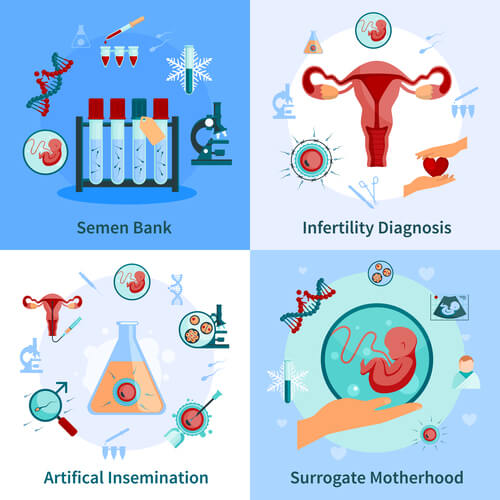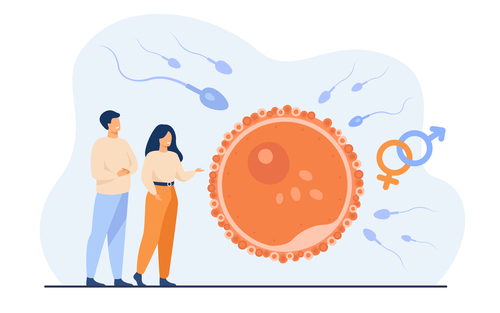When couples encounter challenges conceiving naturally, they often turn to assisted reproductive technologies (ART) to fulfill their dreams of starting a family. In the realm of ART, two commonly utilized procedures are Intrauterine Insemination (IUI) and In Vitro Fertilization (IVF).
While both aim to enhance the chances of conception, they differ significantly in their methodologies, success rates, and associated risks. Understanding the disparities between these two procedures is crucial for couples navigating fertility treatment options.
What is IUI and its Process?
Intrauterine Insemination (IUI) is a fertility treatment that involves placing sperm directly into a woman’s uterus to facilitate fertilization. This procedure is typically recommended for couples with unexplained infertility, mild male factor infertility, or cervical issues.
The process of IUI begins with the collection of sperm, which is then washed and concentrated to isolate the healthiest and most motile sperm cells. Next, a thin catheter is used to introduce the sperm into the uterus, bypassing the cervix and increasing the likelihood of fertilization. IUI is often timed with a woman’s ovulation cycle to maximize the chances of conception.
What is IVF and its Process?

In Vitro Fertilization (IVF) is a more complex fertility treatment that involves fertilizing an egg with sperm outside the body, in a laboratory setting. IVF is typically recommended for couples with more severe infertility issues, such as blocked fallopian tubes, advanced maternal age, or severe male factor infertility.
The process of IVF begins with ovarian stimulation, where fertility medications are administered to stimulate the ovaries to produce multiple eggs. These eggs are then retrieved through a minor surgical procedure known as transvaginal ultrasound aspiration.
Once retrieved, the eggs are fertilized with sperm in a laboratory dish, and the resulting embryos are cultured for several days before being transferred into the woman’s uterus.
What are the Biggest Differences between IUI and IVF?

- Method of Conception: The primary difference between IUI and IVF lies in the method of conception. In IUI, sperm is introduced directly into the uterus, while in IVF, fertilization occurs outside the body, in a laboratory dish.
- Complexity of Procedure: IVF is a more complex and invasive procedure compared to IUI. It involves multiple steps, including ovarian stimulation, egg retrieval, fertilization in the lab, embryo culture, and embryo transfer, whereas IUI is a simpler procedure that does not require ovarian stimulation or surgical intervention.
- Indications: IUI is typically recommended for couples with mild fertility issues or unexplained infertility, while IVF is often recommended for couples with more severe infertility problems or specific medical conditions that prevent natural conception.
- Success Rates: IVF generally has higher success rates compared to IUI, particularly in cases of advanced maternal age, severe male factor infertility, or tubal issues. This is because IVF bypasses many potential barriers to conception that IUI does not address.
What do IUI and IVF Have in Common?
Despite their differences, IUI and IVF share some commonalities:
- Assisted Reproductive Technologies: Both IUI and IVF are types of assisted reproductive technologies designed to help couples conceive when natural methods are unsuccessful.
- Preparation: Before undergoing either procedure, couples typically undergo thorough medical evaluations and may require preliminary tests to assess fertility status.
- Timing: Both IUI and IVF procedures are often timed with a woman’s menstrual cycle to optimize the chances of conception.
- Emotional and Financial Investment: Both IUI and IVF can be emotionally and financially taxing for couples, as they may require multiple cycles to achieve success.
IUI VS. IVF: Success Rates
When comparing success rates, IVF generally boasts higher success rates than IUI. According to the American Society for Reproductive Medicine (ASRM), the success rates for IVF vary depending on factors such as the woman’s age, the cause of infertility, and the number of embryos transferred.
On the other hand, the success rates for IUI are lower, ranging from 8% to 15% per cycle, according to the American Pregnancy Association (APA). However, success rates for both procedures can improve with multiple cycles.
IUI VS. IVF: Side Effects and Risks
Both IUI and IVF carry certain risks and potential side effects:
- IUI Side Effects: Common side effects of IUI may include mild cramping, spotting, and an increased risk of multiple pregnancies due to the release of multiple eggs during ovarian stimulation.
- IVF Side Effects: IVF carries a higher risk of ovarian hyperstimulation syndrome (OHSS), a condition characterized by swollen and painful ovaries due to excessive hormone stimulation. Additionally, there is a slight risk of complications associated with the egg retrieval procedure, such as bleeding or infection.
How to Decide Between IVF and IUI?

Choosing between IVF and IUI depends on various factors, including the severity of infertility, the woman’s age, the cause of infertility, and personal preferences. Couples should consult with a fertility specialist to discuss their options thoroughly and develop a treatment plan tailored to their specific needs and circumstances. Factors such as success rates, cost, and emotional readiness should also be taken into consideration when making this decision.
IUI vs IVF – Know What’s Best for You!
Which Path to Parenthood: Deciding Between IUI and IVF?
In conclusion, while both Intrauterine Insemination (IUI) and In Vitro Fertilization (IVF) are valuable fertility treatments that have helped countless couples achieve their dream of parenthood, they differ significantly in terms of complexity, success rates, and associated risks.
By understanding the nuances of each procedure and consulting with a fertility specialist, couples can make informed decisions about which treatment option is best suited to their unique situation. Ultimately, the goal of both IUI and IVF is to help couples overcome infertility and realize their dreams of starting a family.
FAQs:
IUI involves placing sperm directly into the uterus, while IVF fertilizes eggs with sperm outside the body.
Sperm is collected, washed, and inserted into the uterus through a thin catheter during the woman’s ovulation cycle.
IVF includes ovarian stimulation, egg retrieval, fertilization in a lab dish, embryo culture, and embryo transfer into the uterus.
IUI is typically recommended for mild fertility issues or unexplained infertility.
IVF is often recommended for more severe infertility problems or specific medical conditions hindering natural conception.
IVF generally has higher success rates compared to IUI due to its more invasive nature and direct control over fertilization.
Mild cramping, spotting, and an increased risk of multiple pregnancies are common side effects of IUI.
Risks of IVF include ovarian hyperstimulation syndrome (OHSS) and potential complications from the egg retrieval procedure.
Consult with a fertility specialist to evaluate factors such as the severity of infertility, age, and personal preferences.
The number of cycles needed varies, but multiple cycles may be required for both IUI and IVF to achieve success.








